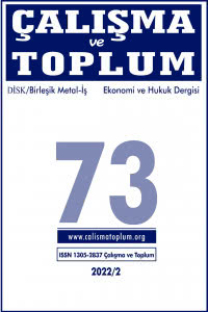Küreselleşme ve sanayisizleşme bağlamında Türkiye'de ve Dünyada demokrasi açığı
Democracy deficit in Turkey in the context of globalızatıon and de-ındustrialization
___
Amin, Samir (2004), Obsolescent Capitalism Contemporary Politics and Global Disorder, Rainbow Publishers, India.Bağımsız Sosyal Bilimciler (2007), IMF Gözetiminde On Uzun Yıl, Yordam Kitap, İstanbul.
Bayram N., Aytac S., Aytac M., Sam N., Bilgel N. (2009), Poverty, Social Exclusion, and Life Satisfaction: A Study From Turkey, Journal of Poverty, 16: 4, s. 375-391.
Bourdieu, Pierre (1998), The Essence of Neoliberalism, Aralık, http://mondediplo.com/1998/12/08bourdieu (05.03.2014), s. 1.
Bourdieu, Pierre (2006), Karşı Ateşler, İstanbul.
Brown, Wendy (2010), We are all democrats now, Agemben et al., Democracy in What State?, Columbia, USA.
Castells, Manuel (2000), The Information Age: Economy, Society and Culture, End of Millennium, Blackwell Publishing, UK.
Cizre, Ümit - Yeldan Erinç (2005), The Turkish Encounter with Neoliberalism: Economics and Politics in the 2000/2001 Crises, Review of International Political Economy, 12:3, August, s. 387-408.
Colas, Alejandro (2007), Neoliberalizm, Küreselleşme Ve Uluslararası İlişkiler, Saad-Filho, Alfredo - Johnston Deborah (Ed.), Neoliberalizm Muhalif Bir Seçki, Yordam Kitap, İstanbul.
Dicken, Peter (2007), Global Shift: Mapping the Changing Contours of the Global Economy, Guilford press, New York.
Ergun, Turgay (2004), Kamu Yönetimi, Türkiye ve Orta Doğu Amme İdaresi Enstitüsü, Ankara.
FESSUD (2013), Annual Conference 2013, http://fessud.eu/?page_id=2017, (07.03.2014).
Fleming, J. Marcus (1962), "Domestic financial policies under fixed and floating exchange rates", IMF Staff Papers, No: 9, s. 369379.
Harriss, John (2004), Depolicizing Development, LeftWord, India.
Hobsbawm, Eric (2008), Küreselleşme, Demokrasi ve Terörizm, Agora, İstanbul.
Huberman, Leo (2005), Feodal Toplumdan Yirminci Yüzyıla, İletişim Yayınları, İstanbul.
İnce, Murat (2009), Küreselleşme ve Yerelleşme Bir Çelişki Mi?, Gazi Üniversitesi İktisadi ve İdari Bilimler Fakültesi Dergisi, 11/ 1, s. 259-275.
İnsel, Ahmet (2007), Post-Demokrasi, İyi Yönetişim ve Caudillo, Birikim, Sayı 223, Kasım, s.29-40.
Koray, Meryem (2011), Kapitalizm Küreselleşirken Dünya Ahvali, Ayrıntı Yayınları, İstanbul.
Krugman, Paul (1991), Increasing Returns and Economic Geography, Journal of Political Economy, Vol. 99, Issue: 3, June, 483-499.
Lakha, Salim - Taneja, Pradeep (2009), Balancing Democracy And Globalization: The Role Of The State In Poverty Alleviation In India, South Asia: Journal Of South Asian Studies, 32: 3, s. 408-424.
Lall, Sanjaya - Teubal, Morris (1998), "Market-stimulating" technology policies in developing countries: A framework with examples from East Asia, World Development, vol. 26(8), August, s. 1369-1385.
MacEwan, Arthur (2007), Neoliberalizm ve Demokrasi: Piyasa İktidarına Karşı Demokratik İktidar, Saad-Filho, Alfredo - Johnston Deborah (Ed.), Neoliberalizm Muhalif Bir Seçki, Yordam Kitap, İstanbul.
Mundell, Robert A. (1963), "Capital mobility and stabilization policy under fixed and flexible exchange rates", Canadian Journal of Economic and Political Science, Vol. 29 No.4, s.475485.
Ohmae, Kenichi (1995), The End of the Nation State: The Rise of Regional Economies, the Free Press, New York.
Obstfeld, Maurice Rogoff, Kenneth S. (1996), Foundations of International Macroeconomics, The MIT Press, Massachusett.
Pamuk, Şevket (2014), Türkiyenin 200 Yıllık iktisadi Tarihi, Büyüme, Kurumlar ve Bölüşüm, İş Bankası Yayınları, İstanbul.
Petras, James Veltmeyer, Henry (2001), Globalization Unmasked: Imperialism in the 21st Century, Zed Books, London and New York.
Powell, Fred Geoghegan, Martin (2006), Beyond Political Zoology: Community Development, Civil Society, And Strong Democracy, Community Development Journal, Vol 41, No 2, April, s.128 142.
Rodrik, Dani (1997), Has Globalization Gone Too Far, Washington, DC, Institute for International Economics.
Rodrik, Dani (2007), How to Save Globalization From Its Cheerleaders, The Journal of International Trade and Diplomacy, 1 (2), Fall, 1-33.
Rodrik, Dani (2007), The inescapable trilemma of the world economy, http://rodrik.typepad.com/dani_rodriks_weblog/2007/06 (05.03. 2014).
Ross, Kristin (2011), Democracy for Sale, Amy Allen (Ed.), Democracy in What State ?, Columbia, New York.
T.C. Başbakanlık (2003), Kamu Yönetiminde Yeniden Yapılanma 1: Değişimin Yönetimi İçin Yönetimde Değişim, Ankara.
The World Bank Group (2014), Decentralization & Subnational Regional Economics, http://www1.worldbank.org/publicsector/decentralization/what.htm, (15.01.2014).
Türel, Oktar (2011), Geç Barbarlık Çağı, Yordam Kitap, İstanbul. UN (1994), World Investment Report 1994, http://unctad.org/en/Docs/wir1994_en.pdf (05.03. 2014).
UN (2014), Democracy, http://www.un.org/en/globalissues/democracy/, (14.01 2014).
Yeldan, Erinç (2006), Neo-Liberal Global Remedies: From Speculative-led Growth to IMF-led Crisis in Turkey, Review of Radical Political Economics, 38(2), Spring, s.193-213.
Yeldan, Erinç (2009), The Economics of Growth and Distribution, Efil Yayınevi, Ankara.
Yeldan, Erinç (2011), Küreselleşme Sürecinde Türkiye Ekonomisi, Bölüşüm, Birikim ve Büyüme, İletişim Yayınları, Istanbul.
- ISSN: 1305-2837
- Yayın Aralığı: 4
- Başlangıç: 2003
- Yayıncı: DİSK Birleşik Metal-İş
Küreselleşme ve sanayisizleşme bağlamında Türkiye'de ve Dünyada demokrasi açığı
ALP ERİNÇ YELDAN, DENİZ YILDIRIM
Kamuda Asıl İşin Bir Bölümü Altişverene Verilirken Muafiyet Var mıdır?
Financial liberalisation and composition of tax revenues in Turkey
On dokuzuncu yüzyıldan günümüze Türkiye'de işsizlikle mücadele politikaları
6552 sayılı Kanunun İş Kanunu ve Sendikalar ve Toplu İş Sözleşmesi kanununa getirdiği yenilikler
Endüstri ilişkileri disiplinin kayıp halkası olarak toplumsal cinsiyet
İşçiler esas itibariyle anlamsız işler ile meşgul edilemezler.
